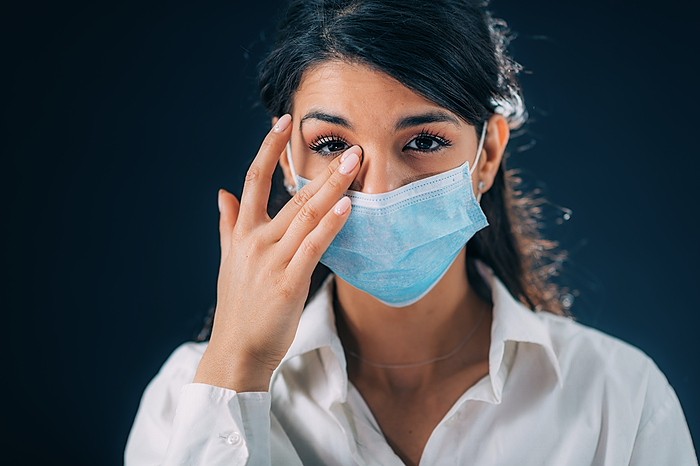Coronavirus and Your Eye Health: What You Need to Know

Are you wondering how to protect your vision during the coronavirus outbreak? Maybe you’re coping with macular degeneration, awaiting cataract surgery, or have pink eye (conjunctivitis). Perhaps you’re concerned about contact lens safety or how to protect your increasingly restless children from an eye injury.
As medical director of Bascom Palmer Eye Institute in Plantation, Kendall E. Donaldson, M.D.,understands your concern. “Everyone is stressed. We need to have understanding and patience as we work through these challenges.”
How coronavirus can affect the eyes
Coronavirus spreads readily through tiny virus particles when someone coughs, sneezes, or talks. People become infected when they breathe in these droplets through the mouth or nose. The virus can also enter the body through the eyes if you touch them after touching something with the virus on it.
The American Academy of Ophthalmology stated that while unusual, coronavirus might also cause conjunctivitis. However, red eyes are more commonly caused by conjunctivitis associated with the common cold, allergies, dry eye, contact lens-related irritation, or a variety of other reasons. Classic viral conjunctivitis (“pink eye”), associated with the same virus that can cause a cold results in redness, tearing, irritation, crusting, and/or swollen eyelids.
Most patients with infectious conjunctivitis have some systemic symptoms such as coughing, sneezing, muscle aches, and enlarged lymph nodes. COVID-19 associated conjunctivitis is found in patients that also have the classic fevers and dry cough associated with the COVID-19 illness.
“If you think you have conjunctivitis, call your ophthalmologist. They can provide home-care instructions and decide if you need to be seen in the office or if telehealth (virtual health visit) may be most appropriate. Conjunctivitis generally clears up quickly with proper care,” says Dr. Donaldson.
If you have pink eye with coronavirus symptoms (fever, dry cough, shortness of breath, fatigue) or were in contact with someone diagnosed with coronavirus, call your family doctor or urgent care center immediately to pursue evaluation and testing.
Now more than ever, we must prevent problems before they start.
Dr. Donaldson reiterates CDC guidelines. “Don’t touch your face and regularly wash your hands vigorously for 20 seconds with soap and water. Hand sanitizer is also very effective in killing COVID-19, as long as it contains at least 60% alcohol.”
Take special care with contact lens hygiene. Even before the pandemic, Dr. Donaldson counseled patients to wash their hands thoroughly before and after handling contacts. And it’s never a good idea to sleep in your contact lenses, as this dramatically increases the risk of infection.
Glasses offer some protection from airborne particles; however, “try to limit touching them. Periodically clean the frames with an alcohol pad and the lenses with warm soapy water,” says Dr. Donaldson.
If you use prescription eye medication, “Continue all medications as you were instructed before the COVID-19 crisis. Keep track of refills, so you don’t have to maneuver through the system at the last minute when doctors and pharmacies have limited hours and availability.”
Eye conditions you can treat at home
Some eye conditions can be safely treated at home. Speak to your doctor or their nurse for advice on treating these conditions:
- Pink eye (if no coronavirus symptoms)
- Stye
- Eye allergies
- Eyestrain
- Dry eye
- Black eye
- Bloodshot eyes
If you’re wondering whether your child needs to see an eye doctor, review these guidelines from Dr. Ta Chen P. Chang, a pediatric ophthalmologist at the Bascom Palmer. While school and sports gatherings are closed, that doesn’t mean kids can’t get injured. Provide protective eyewear to avoid sports-related eye injuries.
Eye conditions that require medical care
If you have a chronic eye condition, take medicine as prescribed, and follow your doctor’s instructions. Bascom Palmer is contacting patients who have an upcoming appointment scheduled. If you have any eye health concerns, call before scheduling a follow-up visit.
Call your doctor immediately if you experience:
- Changes in your field of vision such as blurriness, wavy or blank spots
- Sudden loss of vision
- Sudden onset, or a large number of new floaters or flashes
- Eye pain, red eye, headache, nausea, and vomiting
Prevention and protection
We know that certain precautions slow the spread of coronavirus and lessen the strain on health care providers. This applies to eye health, too. With time on your hands, you may be tempted to start a home improvement project. Great idea! Just protect yourself against common eye injuries.
Today, more than ever, you can help your health care providers help you.
“Follow the safety guidelines to avoid infection and remain patient as we strive to preserve your health and your vision,” says Dr. Donaldson.
To contact Bascom Palmer Eye Institute, call 888-845-0002 or visit the website.
Nancy Moreland is a contributing writer for UMiami Health News.
Tags: coronavirus, COVID-19, Dr. Kendall Donaldson
